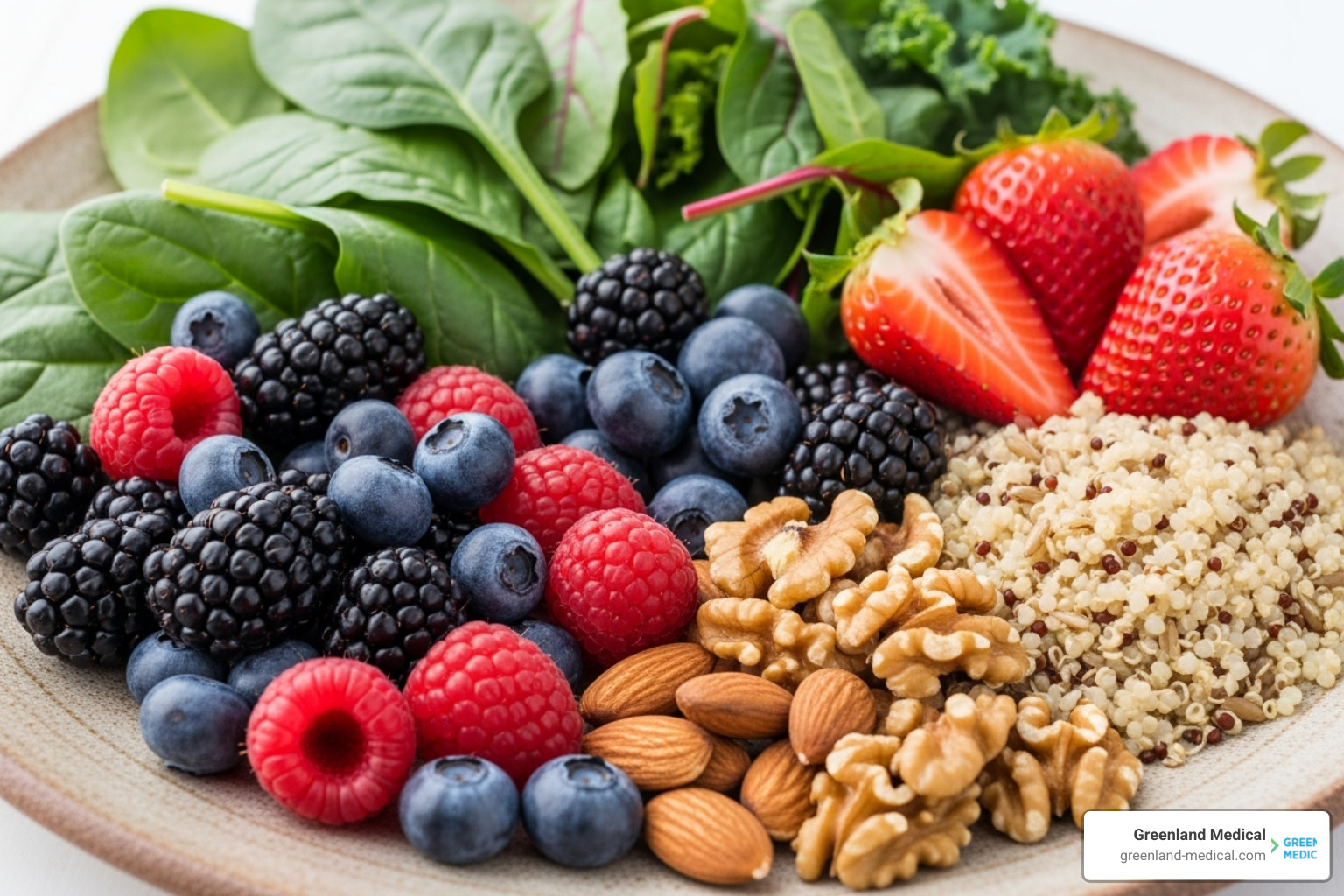
Going Natural Against Dementia: Herbs, Supplements, and Lifestyle Hacks
Why Natural Approaches Matter in the Fight Against Dementia
Natural remedies for dementia offer evidence-based options to support brain health and manage symptoms alongside conventional care. While no cure exists, research shows that specific herbs, dietary changes, and lifestyle interventions can slow cognitive decline and improve quality of life.
Quick Answer: Top Natural Remedies for Dementia
Ginkgo biloba - Improves blood flow to the brain and shows clinically relevant positive results in Alzheimer's patients
Saffron - Comparable cognitive improvements to donepezil in 22-week trials
Huperzine A - Potent acetylcholinesterase inhibitor that improved cognition with minimal side effects
MIND Diet - Combines Mediterranean and DASH diets, slowing cognitive decline equivalent to being 7.5 years younger
Regular exercise - Boosts brain-derived neurotrophic factor (BDNF) for better memory and learning
Essential oils - Lavender and lemon balm reduce agitation and improve sleep quality
Current prescription drugs for dementia often provide only temporary symptom relief and can have significant side effects, leading many to seek gentler, more comprehensive approaches.
Recent studies validate that certain plants and lifestyle practices can genuinely support brain function. The key is understanding which remedies have solid scientific backing and how to use them safely with conventional care.
As Dr Andrew Greenland, a Certified Functional Medicine Practitioner and Bredesen Protocol specialist, I've witnessed how integrative approaches to natural remedies for dementia can transform patients' cognitive trajectories. My work at Greenland Medical focuses on addressing the root causes of neuroinflammation and cognitive decline through evidence-based natural interventions.
The MIND Diet: Fueling Your Brain to Fight Dementia
One of the most powerful natural remedies for dementia might be in your kitchen. The MIND diet is a scientifically-backed approach that can add years to your brain's healthy life.
MIND, or Mediterranean-DASH Intervention for Neurodegenerative Delay, combines two of the world's healthiest eating patterns: the Mediterranean and DASH diets.

Researchers found that close adherence to the MIND diet slowed cognitive decline by an equivalent of 7.5 years, effectively turning back the clock on cognitive aging. The diet focuses on foods rich in antioxidants and anti-inflammatory compounds, which protect brain cells from the damage that leads to dementia.
Key Foods to Incorporate
The MIND diet is about embracing delicious, brain-protecting foods as part of your daily routine.
Leafy greens like spinach and kale are loaded with folate, vitamin K, and carotenoids that keep memory sharp. Aim for at least six servings a week.
Berries like blueberries and strawberries contain flavonoids that improve communication between brain cells. Target two servings a week.
Nuts and olive oil provide healthy fats. Walnuts, almonds, and pecans offer vitamin E and omega-3s to protect brain tissue. Extra virgin olive oil is a go-to cooking fat that fights inflammation.
Whole grains like quinoa and oats provide steady, sustained energy for optimal brain function. Aim for three servings daily.
Fish is a vital food group for brain health. Fatty fish like salmon and sardines are packed with DHA, an omega-3 that is a building block of brain tissue. Since our bodies can't produce it, aim for at least one serving of fish per week.
Beans, legumes, and poultry provide lean protein and B vitamins for steady energy and brain support, without the inflammatory effects of red meat.
The diet also suggests limiting foods that can harm brain health, such as red meat, butter, cheese, pastries, and fried foods, as they can increase inflammation and accelerate cognitive decline.
This approach is sustainable because it's about progress, not perfection. Even modest changes can benefit brain health. At Greenland Medical, we help patients create personalized nutrition plans that fit their lifestyles.
For more detailed information about specific brain-boosting foods and their benefits, you can explore this helpful resource: 5 Brain-Boosting Foods That Can Fight Dementia.
The MIND diet proves that some of the most effective natural remedies for dementia aren't found in a bottle—they're found on your dinner plate. By making these simple food choices, you're actively protecting your most precious asset: your mind.
Evidence-Based Natural Remedies for Dementia: What Science Says
Beyond diet, herbal medicine and supplements offer promising natural remedies for dementia. While no magic bullet exists, research highlights several compounds that can help manage symptoms. At Greenland Medical, our approach is rooted in evidence, considering the science behind each remedy.

Current dementia treatments have limitations, leading many to explore complementary therapies. Some herbs have undergone significant scientific scrutiny, revealing their potential to modulate brain chemistry, improve blood flow, or provide neuroprotective benefits.
Key Herbal and Natural Remedies for Dementia Symptoms
Here are some of the most studied natural remedies for cognitive health:
Ginkgo biloba: This well-known extract (EGb 761) has shown clinically relevant positive results in Alzheimer's patients in a meta-analysis of RCTs, modestly improving cognitive ability. It's thought to work by improving brain blood flow and acting as an antioxidant. While it may not prevent dementia, research supports its use for managing symptoms.
Huperzine A: From the Chinese club moss (Huperzia serrata), Huperzine A is a potent acetylcholinesterase (AChE) inhibitor, working similarly to some prescription drugs by preserving the memory neurotransmitter acetylcholine. A meta-analysis of RCTs shows it improved cognition with minimal side effects.
Saffron: In a 22-week trial, saffron (Crocus sativus) showed cognitive improvements in Alzheimer's patients comparable to the prescription drug donepezil, suggesting it's a valuable natural alternative.
Panax ginseng: Used for thousands of years in Traditional Chinese Medicine, studies show Panax ginseng can improve cognitive performance in healthy volunteers. While more dementia-specific trials are needed, its history and preliminary findings are promising.
Here's a table comparing the effectiveness and proposed mechanisms of these key natural remedies:
Remedy Effectiveness (Based on Research) Proposed Mechanisms Ginkgo biloba Clinically relevant positive results in AD patients; modest improvement in cognitive ability. Improves cerebral blood flow, acts as an antioxidant (protects brain cells from damage), anti-inflammatory effects, modulates neurotransmitter systems. Huperzine A Improved cognition with minimal adverse effects in RCTs. Potent acetylcholinesterase (AChE) inhibitor (prevents breakdown of acetylcholine, a memory neurotransmitter), neuroprotective properties, modulates NMDA receptors. Saffron Comparable cognitive improvements to donepezil in AD patients. Antioxidant, anti-inflammatory, modulates neurotransmitters (serotonin, dopamine), neuroprotective effects, may prevent amyloid-beta aggregation. Panax ginseng Improved abstract thinking, attention, information processing, and cognitive performance in healthy volunteers. Adaptogenic properties (helps body adapt to stress), neuroprotective, antioxidant, anti-inflammatory, modulates neurotransmitter systems, improves cerebral blood flow, may promote neurogenesis (growth of new brain cells).
For more general information on alternative treatments, you can consult resources like Alternative treatments for dementia - general information.
Safety First: Risks and Interactions of Herbal Supplements
While promising, natural remedies require caution. "Natural" doesn't mean "safe," especially with complex conditions like dementia and potential drug interactions. A primary concern is the lack of regulation. Unlike prescription drugs, supplements are not always evaluated for safety, effectiveness, or purity before being sold.
Potential risks include:
Side Effects: Natural substances can have side effects. For example, Ginkgo biloba carries a bleeding risk, especially with blood thinners.
Drug Interactions: Herbs can interact with prescriptions, altering their effects. St. John's wort, for instance, interacts with many drugs. Always disclose all supplements to your doctor and pharmacist.
Quality and Dosage: Lack of regulation means supplement content and dosage can be inconsistent. Choose reputable manufacturers with third-party testing.
Always consult a qualified healthcare provider before starting any new supplement, especially if you are on other medications. A doctor can assess risks and determine if a supplement is appropriate for you. We believe in empowering patients with knowledge to ensure every step towards natural healing is both informed and safe. For more information on supplement safety, you can refer to resources like Information on supplement safety from NCCIH.
Beyond Diet: Powerful Lifestyle Hacks for Brain Health
While diet is foundational, powerful natural remedies for dementia extend to lifestyle. Our brains have neuroplasticity—the ability to form new connections throughout life. Simple lifestyle changes can make our brains more resilient and protected against cognitive decline.

At Greenland Medical, we've seen patients transform their cognitive health with these approaches. The key is consistency and finding what works for you.
Building a Brain-Protective Routine
A brain-healthy routine doesn't require a life overhaul; small, sustainable changes yield remarkable results.
Physical activity is a powerful tool for brain protection. Exercise boosts Brain-Derived Neurotrophic Factor (BDNF), which acts like fertilizer for brain cells, helping them grow and stay healthy. A brisk 30-minute walk most days, dancing, or swimming is enough to get your heart pumping.
Mental stimulation from puzzles, games, or learning a new skill builds "cognitive reserve." This backup system helps your brain compensate for age-related changes. Activities like learning an instrument, reading, or even deep conversations create fresh neural pathways.
Quality sleep is your brain's nightly cleaning crew, washing away toxic proteins linked to Alzheimer's. Good sleep hygiene—a consistent schedule, a cool, dark room, and no pre-bed screens—improves sleep and cognition.
Stress management via mindfulness and meditation protects the brain from chronic stress, which causes inflammation and can accelerate cognitive decline. Simple practices like deep breathing, yoga, or time in nature can lower stress.
Social engagement is crucial for brain health. Maintaining meaningful relationships helps preserve cognitive function. Join a club, volunteer, or meet with friends. Lifelong learning in social settings combines multiple brain-protective benefits.
Oral health is linked to brain health. Poor oral hygiene and gum disease are linked to increased dementia risk, as bacteria can travel to the brain and cause inflammation. Regular brushing, flossing, and dental checkups are vital.
Our brain's autophagy system is a natural cleanup crew that removes damaged proteins. This process is so effective that some people with Alzheimer's-related brain changes never develop symptoms. Regular exercise and healthy eating can support this vital function.
These lifestyle approaches work synergistically: exercise improves sleep, which reduces stress, which encourages social engagement. Start with one or two manageable changes and build from there. Every positive step helps your brain.
Soothing Symptoms with Complementary Therapies
Managing dementia also involves addressing challenging behavioral and psychological symptoms (BPSD) like agitation and anxiety. Complementary therapies offer gentle, non-pharmacological interventions that can improve mood and quality of life without the side effects of medication. These natural remedies for dementia symptoms focus on comfort and emotional well-being.
Gentle Approaches for Behavioral Symptoms
At Greenland Medical, we've seen these therapies make a real difference in our patients' well-being:
Aromatherapy uses essential oils to create calming or uplifting effects. Lavender (Lavandula angustifolia) is well-known for reducing agitation and improving sleep. Lemon Balm (Melissa officinalis) is also soothing and may help improve mood. It's important to use high-quality, diluted oils and consult your doctor before use, as they are not FDA-regulated and can interact with medications.
Music therapy is a powerful tool that can reach beyond cognitive challenges. Personalized music playlists often tap into long-term memories, reducing agitation, improving mood, and even aiding memory recall. Calming music can help with sleep, while lively tunes can be engaging during the day.
Pet therapy, or animal-assisted therapy, provides calming companionship. Interacting with a friendly animal can reduce loneliness and anxiety, provide a sense of purpose, and encourage gentle physical activity. The connection with an animal can be deeply enriching.
Other supportive approaches include Bright Light Therapy to regulate sleep cycles and reduce anxiety, and Acupuncture, which early studies suggest may help with mood and sleep. The use of Cannabis (CBD/THC) is an evolving area; some reports suggest it may help with agitation or pain, but it must be used only under strict medical guidance due to legal and safety concerns.
These gentle approaches are designed to manage the daily challenges of dementia, focusing on comfort and quality of life. They work best as part of a personalized, comprehensive care plan. For more general information on alternative therapies, you can explore resources like those found here: Learn more about alternative therapies - general information.
Conclusion: Creating Your Integrated Dementia Care Plan
The path through dementia care isn't hopeless. Natural remedies for dementia offer genuine hope when combined thoughtfully with conventional treatments. The key is weaving together multiple evidence-based approaches that honor both the science and the individual.
At Greenland Medical, we see how a holistic approach transforms lives. By addressing root causes of cognitive decline—like inflammation, poor sleep, or nutritional deficiencies—we give the brain what it needs to heal, rather than just managing symptoms.
Personalization is key. No two people experience dementia the same way, so no two treatment plans should be identical. Some patients respond well to the MIND diet and supplements, while others find breakthroughs with stress reduction and exercise.
Our approach empowers patients and families with knowledge and practical, research-backed tools. We believe you deserve to understand your options. At Greenland Medical, we're passionate about blending modern diagnostics with time-tested natural therapies. Whether you're in Richmond, Twickenham, or anywhere across London, our goal is creating a comprehensive care plan that fits your unique needs. For more detailed information about our Functional Medicine approach to cognitive decline, including the Bredesen Protocol, please visit More info about our Functional Medicine approach to cognitive decline.
Making Informed Choices About Natural Remedies for Dementia
Making smart decisions about natural remedies for dementia is possible. With the right approach, you can confidently choose interventions that support your loved one's well-being.
Partnering with your doctor is the foundation of safe care, especially when considering supplements alongside prescriptions. Your provider can spot interactions and monitor responses to new treatments.
Starting with lifestyle changes often yields the most improvement with the least risk. The MIND diet, exercise, quality sleep, and stress management are backed by science and have minimal side effects.
Evaluating scientific research helps separate real opportunities from empty promises. Look for studies on dementia patients, like randomized controlled trials, which carry more weight than testimonials.
Monitoring for effects and side effects requires patience. A simple journal tracking mood, sleep, and cognition is invaluable for your healthcare team to see what's working.
Creating a comprehensive care plan unites everything. The most successful plans combine conventional treatments with evidence-based natural interventions, addressing cognitive, emotional, and physical well-being.
This journey requires hope and realism. While there is no cure, we can improve quality of life, slow progression, and sometimes see cognitive improvements. Working with experienced practitioners gives your loved one the best chance to maintain dignity, connection, and joy.
